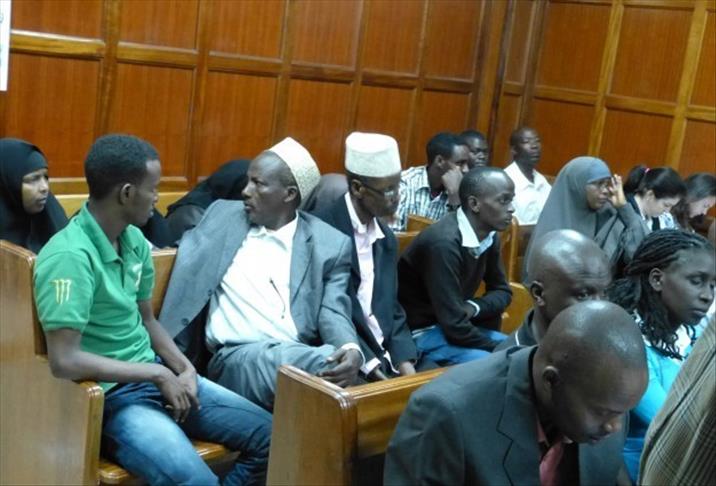
by James Shimanyula
NAIROBI
Kenyan lawmakers, reportedly the second highest paid legislators globally, are divided over whether or not they are prepared to take pay cuts.
"When you look at the international labor laws, salaries don't go down," Deputy Parliament Speaker Chris Wamalwa told Anadolu Agency at the parliament building in Nairobi.
"Salaries go up. Two wrongs don't make a right," said Wamalwa, who represents the Kiminini constituency in the Rift Valley region's Trans Nzoia County.
President Uhuru Kenyatta recently declared that he and Vice President William Ruto would both be taking 20-percent pay cuts.
He suggested the salaries of government ministers and lawmakers would be reduced by 10 percent to offset the country's high wage bill.
Wamalwa, however, dismissed the president's declaration was illegal.
"So we're totally opposed to that," he stressed. "But if some people feel they are sufficiently philanthropic that they can do that, let them do so."
"The government should focus on eliminating waste and the corruption cases we have," he added.
Kenyan lawmakers are among the highest paid legislators, not only in Africa but globally, according to a recent study by the U.K.-based Independent Parliamentary Standards Authority and the International Monetary Fund.
According to the study, the world's highest paid MPs are those from Nigeria, Kenya, Ghana, Indonesia and South Africa.
According to official figures, Kenyan lawmakers earn $15,000 a month in salary and allowances, while the average Kenyan worker takes home a mere $1500 a year.
But Sarah Serem, chairperson of Kenya's Salaries and Remuneration Commission, was extremely cautious when asked whether the pay cuts were likely to affect parliamentarians.
Under Kenya's new constitution, Serem said, her salaries commission was responsible for implementing pay cuts.
However, she added, the commission could not issue a policy statement on the pay cuts since salaries were guaranteed by the law.
Serem said the commission could not force individuals – including public servants – to take pay cuts.
"But if they identify with the situation as it is now in the country, and they feel they want to participate – even giving that which belongs to them for the sake… of this country and the sustaining of economic growth – truly that is what we look forward to," she told AA.
Asked whether she planned to push for parliamentary pay cuts in the days ahead, Serem asserted: "We won't do that."
Defiant
MP Rachel Ameso Amolo, a representative for Western Kenya's Kakamega County, said salary cuts would bring misery to more than 700,000 government workers.
"Reducing or cutting salaries isn't going to help the people in this country," she told AA. "Government workers will only suffer; they'll be reduced to paupers."
Esther Nyambura Gathogo, MP for Ruiru in central Kenya, said the Salaries and Remuneration Commission should only target those earning more than lawmakers.
"Everybody [is focusing] on MPs, but I think there are many people who are earning more," she told AA.
Gathogo argued that much of the public failed to realize the communities that lawmakers support.
"I don't even have my salary. I have committed my salary to orphans. I support most of the children in their schools," she asserted.
MP Kirwa Stephen Bitok, who represents the Mosop constituency in the Rift Valley region, said lawmakers –just like other Kenyan public servants – did not set their own salaries.
According to Bitok, parliamentarians' salaries are determined by the Salaries and Remuneration Commission.
"MPs should be given the opportunity to serve their people well, because it's a unique sort of work, such that if you tamper with salaries, it becomes difficult to serve the people," he told AA.
Willing
MP Mohamed Shidiye, who represents Kenya's northeastern Lagdera constituency in Garissa County, is prepared to take a salary decrease.
"I want my salary reduced by 15 percent," he told AA. "I support my president. It [proposed wage cuts] is appropriate because we have a soaring wage bill."
Kenya spends some $4.6 billion each year to pay public-sector salaries.
"It's not sustainable. We have to do something. We have to better the situation," Shidiye said.
President Kenyatta has expressed concern that the country's mushrooming public-sector wage bill was hampering the country's development plans and leaving the government with only 200 billion shillings (roughly $2.3 billion) a year.
Also prepared to take a pay cut is Irshadali Mohamed Sumra, MP for Embakasi South, located east of Nairobi.
"The day the president announced [plans to make pay cuts], I was the first person to say 'Yes, my salary should be reduced'," he told AA.
"It's timely. As leaders, we should lead by example," Mohamed asserted.
But Serem, the salaries commission chairwoman, said that even if Kenyans were subject to pay cuts, it still wouldn't serve to reduce the country's wage bill.
"The cut is one of the strategies… so that we can start off a process of looking at strategies to address it [the national wage bill]," Serem told AA.
englishnews@aa.com.tr
Anadolu Agency website contains only a portion of the news stories offered to subscribers in the AA News Broadcasting System (HAS), and in summarized form. Please contact us for subscription options.

